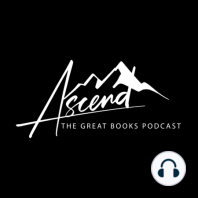67 min listen

Iliad: Book 13 | Battling for the Ships
Iliad: Book 13 | Battling for the Ships
ratings:
Length:
46 minutes
Released:
Mar 26, 2024
Format:
Podcast episode
Description
Deacon Harrison Garlick and Adam Minihan welcome Thomas Lackey back to the podcast to discuss Book 13 of The Iliad, Battling for the ShipsIn this episode we will discuss:What happens in book thirteen?How does the story of Asius end?Why Adam is frustrated with this book and why it's Dcn. Garlick's least favorite so far.What else should be noted in book thirteen?Want our whole guide to The Iliad? Download it for free.Zeus, Father Zeus, they say you excel all others… all men and gods, in wisdom clear and call—but all this brutal carnage comes from you. - King Menelaus (13.727)64. What happens in book thirteen?Father Zeus, believing that the deathless gods will not violate his strict decree to not interfere with the Trojan war, turns his attention “a world away to the land of the Thracian horsemen” (13.06). Poseidon seizes this opportunity to help the Achaeans. He blesses the Aeantes (13.74) and whips up the fighting strength of the whole Argive army (13.112). Battalions are formed around the Aeantes, and they war against Hector and his Trojans (13.149). Meanwhile, the two Achaeans, Idomeneus and Meriones, rush to the left flank where the Argives are suffering the most (13.363, 80). Poseidon continues to secretly war against the will of Zeus by spurring on the Achaeans against the Trojans (13.408). Idomeneus, the Achaean, crushes the Trojan Asius (13.452) and Alcathous (13.512) on the left flank. In return, Aeneas, the son of Aphrodite, arrives to bolster the Trojans and both sides clash around the corpse of the Trojan Alcathous (13.575). Menelaus, the Spartan King, squares off with Helenus, the Trojan prophet (13.672). Helenus’ arrow bounces off the Achaean war-lord’s breastplate (13.679), but Menelaus’ spear goes through Helenus’ first (13.686)—and his Trojan campions drag him away from the battlefield for care (13.687). While the Argives hold the left flank, Hector, favored by Zeus, continues to collide against the Achaeans, blessed by Poseidon, back where Hector smashed the gate (13.785). Polydamas advises Hector to regroup, warning Hector that he has been blessed to fighting power but not necessarily in tactics (13.841). Hector listens, and he goes to recall his warlords (13.873). Hector finds Paris and the carnage that the Trojans suffered on the left flank (13.884). The two princes rejoin the main force at the broken gate, but the Achaeans are immovable under the leadership of giant Ajax (13.935). Ajax taunts Hector that the Trojans will be forced to retreat soon, and a bird-omen appears to confirm his words (13.948). Hector returns the taunt, and both sides prepare for another Trojan charge (13.951). 65. How does the story of Asius end?We met Asius charging his chariot into the Achaean wall and—as the attempt fails—calling Zeus a liar (Question 60). In book thirteen, Idomeneus spears Asius in the throat with the tip “ripping” through the nape of his neck (13.450). Later, Asius’ son, Adamas, is speared by Meriones “between the genitals and the naval—[a] hideous wound, the worst the god of battles deals to wretched men” (13.657). Homer describes him as “hugging the shaft he writhed, gasping, shuddering (13.660). Given the manner of their deaths, one is left inclined that Asius has brought the doom of Zeus upon himself by his own words. 66. What else should be noted in book thirteen?Despite his prowess on the battlefield, it is notable that giant Ajax does not immediately recognize Poseidon in the...
Released:
Mar 26, 2024
Format:
Podcast episode
Titles in the series (21)
Iliad: Book 2 | The Great Gathering of Armies by Ascend - The Great Books Podcast